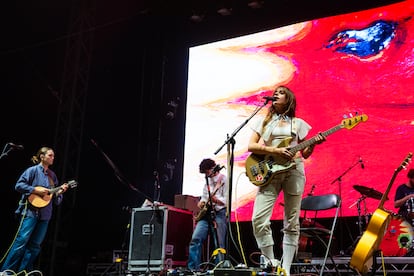Black Country, New Road: The British band that turned the loss of their leader into an opportunity

At first glance, they seem like a band straight from another decade. In a world that now almost exclusively worships solo artists, it seems strange and almost anachronistic to see six musicians arrive together to give an interview. But Black Country, New Road aren't known for going with the flow. Formed in Cambridge, they have established themselves as one of the most magnetic and unclassifiable British bands of their generation. Their approach combines experimental rock with the sensibility of a chamber sextet, shot through with echoes of spectral folk and a lyrical ambition that has become their trademark. Their songs combine emotional density and post-adolescent scruff. They're cool in the way that people were cool back at the turn of the millennium: effortlessly and ostentatiously. They grew out of their city's student scene, a small but fertile ecosystem where everyone hung out in the same bars. There, studying at rival schools and performing on tiny stages, they forged the complicity that continues to sustain the group.
They are between 24 and 28 years old. They introduce themselves one by one: Charlie Wayne (drums, redhead with a serene and thoughtful expression), May Kershaw (keyboards and accordion, silent but attentive), Luke Mark (guitar, with a prominent mustache and a sharp wit), Tyler Hyde (bass and clarinet, whose melancholic features hide a lively and graceful woman), Lewis Evans (saxophone and flute, reminiscent of a slightly more lanky Sufjan Stevens), and Georgia Ellery (violin and mandolin, intense gaze and firm speech). They arrive late: they got lost in "a giant supermarket" in Glòries, next to their Barcelona hotel, where they stayed during the last Primavera Sound. It was their third visit to a festival they like, they say, because "it takes place on concrete."

The departure of their former frontman, vocalist Isaac Wood, who left the band in 2022 due to mental health issues , marked a turning point. What could have precipitated the group's end became a new beginning: without a dominant figure, Black Country, New Road was completely transformed, adopting a collective dynamic that is reflected in their latest album, Forever Howlong (Ninja Tune / PIAS). On the album, everyone participates actively, and the three women in the group take turns taking on the role of vocalist. The sound is brighter and more baroque. Their compositions seek catharsis, but also celebration, with less rigid structures and a greater dose of joy, with a couple of songs dedicated to a theme like friendship.
The album was born with a focus on live performance. “We wanted to make music that we would enjoy playing live,” explains Luke, aware that their previous work included themes that became difficult to defend. “Some of it touched on very personal matters, and it wasn't always pleasant reliving those experiences night after night. Yes, we wanted to make something a little more celebratory,” he adds. The new working method resembles a permanent assembly, a small socialist republic where no one imposes and everything is up for debate. “Every decision was discussed, discussed, and rehearsed,” confirms May. And although Tyler insists there was no express desire to sound more adult, he admits that the songs give off a different, perhaps more mature, air. “The working title was 18+ ,” he jokes.
It all started in the middle of the last decade. Charlie and Luke met in high school music classes when they were just 16. The story continued in London, at the Guildhall School, a leading conservatory where they met Georgia and, soon after, May. It was then, around 2018, that the band began to take final shape. Tyler, who was initially a dedicated fan, spent months insisting that they let her join. “I asked them a hundred times, but they told me I wasn't ready,” she recalls with a laugh. Until, finally, they accepted. They say, jokingly, that they don't regret it.
In reality, they seem like a group of friends on vacation: they laugh, interrupt each other, and tell endless anecdotes, as if this interview were just an excuse to share a good time. They say friendship is the glue that holds everything together. “It would be impossible to continue if we were angry; I can't understand how other bands manage to do that,” says Tyler. Think of those bands who, after years of touring, still act like office workers: they fulfill their contract, get on stage, and collect their paycheck, even though they can't stand each other anymore. “If one day we really fought, the band would end,” says Charlie. Tyler, true to his irony, counters: “Although maybe an argument would make an incredible record…” he smiles, citing illustrious examples like ABBA's latest album or Fleetwood Mac's Rumours , born from the ashes of their internal battles.
Musically, they tend to follow a less-trodden path. Their references aren't typical of a young band: they cite Randy Newman and Van Dyke Parks , along with albums by Fiona Apple and Joanna Newsom, as their role models. Luke admits they're drawn to "that feeling of starting a song without knowing where it's going to lead." Tyler attributes this to a time lag: "The beauty of Randy Newman is his twisted way of writing songs. At first, I thought they were too weird or funny, but then you understand how they work and discover their sophistication. Maybe we were born in the wrong generation." Georgia agrees, although she clarifies: "I would have loved to go to those seventies concerts, although I don't know if I would have liked to live in that world."
It's tempting to imagine what they would have done in the 1990s, during the early Blairite era and the "Cool Britannia" slogan, when the United Kingdom seemed at the height of its cultural influence. "A lot of people describe it as a country in decline," May acknowledges. They share the sadness over Brexit and the isolationism it brought with it, and they don't hide their shame at "the behavior of English people abroad," at a festival where they'd never seen so many of their fellow countrymen drunk. At the same time, they reclaim the richness of their heritage. "British musical tradition is too diverse to be understood as a single block. I would never go on stage wearing a Union Jack, but I still feel proud of some things," says Charlie.

Looking ahead, they've announced a slight change of direction. The songs they're writing for their next album will adopt a more conventional format: they'll be three and a half minutes long, something that until recently would have seemed unthinkable. The next step, they hint, could be "a rock album with choruses," although it's hard to tell if they're serious or just playing it cool. For now, they're still just six twenty-somethings without a master plan, celebrating each concert as if it were unrepeatable.
Solo careers? The answer is unanimous. “It would be a huge pressure to be a solo artist,” Lewis rules out. “Creatively, it’s more rewarding to be in a band,” Tyler agrees. Despite the fact that many more singers are born than groups these days, Charlie remains optimistic: “They’re not very fashionable right now, but bands will come back.” Luke looks to the horizon: “We want the longevity that Wilco has.” “Or that of Stereolab,” Charlie adds. And Tyler, true to his irony, takes it to the extreme: “I would love for us to become huge for a month, have our big moment, and then suddenly disappear.” Best not to bet against it: this republic of six still has plenty of anthems left to compose.
EL PAÍS

%3Aformat(jpg)%3Aquality(99)%3Awatermark(f.elconfidencial.com%2Ffile%2Fbae%2Feea%2Ffde%2Fbaeeeafde1b3229287b0c008f7602058.png%2C0%2C275%2C1)%2Ff.elconfidencial.com%2Foriginal%2Fbbe%2Fdbf%2F69f%2Fbbedbf69fad383ea4422a82dc762fe8a.jpg&w=1280&q=100)


%3Aformat(jpg)%3Aquality(99)%3Awatermark(f.elconfidencial.com%2Ffile%2Fbae%2Feea%2Ffde%2Fbaeeeafde1b3229287b0c008f7602058.png%2C0%2C275%2C1)%2Ff.elconfidencial.com%2Foriginal%2Fdff%2F996%2F533%2Fdff9965334471b6c668d090f1f16b67f.jpg&w=1280&q=100)
